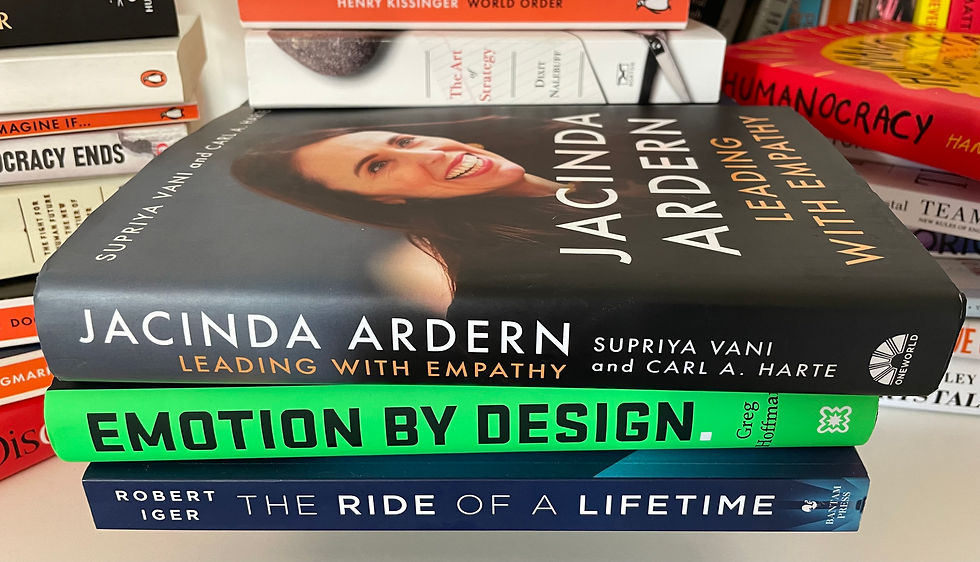Leading with Empathy
- Tom Matthew

- Jan 12, 2023
- 4 min read
Updated: Jan 18, 2023
em·pa·thy [noun]: the ability to understand and share the feelings of another
We desperately need more empathetic leaders.
At eight years old, after a day being entertained by a clown at school, Jacinda Ardern wrote in her diary that she wanted to become a clown so she could make everyone happy. Twenty-nine years after that diary entry, she was sworn in as the youngest Prime Minister of New Zealand in 150 years, and the youngest female world leader.
There are plenty of countries led by clowns, but New Zealand is not one of them. A leader unique among leaders, Ardern gained global attention for her sense of humanity, her strength and integrity, and having a level of authenticity that evades most politicians.

As she batted away numerous crises - a bushfire, a terrorist attack, floods, and a volcanic eruption all in one year, not to mention Covid-19 - it became apparent that Ardern's ability to lead and communicate with empathy was powerful.
Politicians always say, “I understand how you feel”, but Ardern shows it.
Following the brutal terror attack at a Mosque in Christchurch, livestreamed on Facebook, Ardern spoke to the media with notes jotted on the back of an A4 agenda from a function the previous evening. She said...
"... Many of those who will have been directly affected by this shooting may be migrants to New Zealand, they may even be refugees here. They have chosen to make New Zealand their home, and it is their home. They are us."
The day after the attack, Ardern visited Christchurch to speak with local Muslim leaders adorned in a black hijab. "I have many roles as Prime Minister", Ardern said with tears in her eyes, "but at the moment I have one incredibly important job: to bring with me the message of love and support and grief from the people of New Zealand."
Her empathetic leadership united a nation in the midst of their pain.
In a so called 'age of polycrisis', the ability to lead with empathy is critical to leadership success.
But while empathetic leadership is especially important in times of crisis, there are two other continual contexts where I think empathy is especially powerful. The first is the context of polarisation and generational divides, and the second is the context of the digitalisation of organisational management and leadership.
Polarisation and generational divides
Our world is divided. Division, when taken literally, is not necessarily a bad thing. We need things split into smaller chunks so they are manageable – too many unpredictable variables is scary; it is why most prefer to stay in hotels divided into rooms rather than in open-plan hostels. The problem is when smaller chunks resent the other chunks.
There are always generational divides but, as a Gen Z'er, I feel there is an unusually challenging struggle to communicate between generations. Gen Z’s affinity with communication technology probably plays a part, but there are also fundamentally different world views at play. Voting behaviour is no longer best predicted by social class or level of education: age is the most accurate predictor of how someone will vote in most democracies.
Political divide layered and mixed with generational divide creates real tension, and this is where empathy and the willingness to attempt to understand the emotions driving the other side are so important; it is a pre-condition to effective communication across divides.
The difficulty is when one side sees the other as irreconcilably different and therefore refuses to engage. We need unusually empathetic leaders like Ardern to take the lead, turn the cheek, and listen to understand so that others might follow. This is empathetic leadership in practice.
Digitalisation of organisational management and leadership
With behaviour becoming increasingly turned into data, it is easy for leaders to lean into the seductive simplicity and clarity of data points when trying to understand the people they lead, instead of connecting with people on a human-to-human level.
This is where it might be useful for leaders to separate their role as managers from their role as leaders.
As a manager, of course quantification and data are hugely useful tools for simplifying vast amounts of messy information, tracking performance, understanding wellbeing, and identifying sticking points within the organisation.
However, as a leader, data is not enough. Leadership is about understanding people as people, in all their vast complexity and frailty, in all their richness and diversity, with all their struggles and dreams. AI or any other advanced technology cannot replicate the power of a leader who can empathetically and deeply connect with the people they lead.
In our digital age, I think the highest performing teams and organisations will be those that harness the most advanced technologies for the stuff advanced technology is good at, but who are led by people who excel in the things technology cannot touch: human connection, emotion... empathy.
We need more empathetic leadership, we need more leaders like Jacinda Ardern.
"It takes courage and strength to be empathetic. And I am very proudly an empathetic, compassionately driven politician... I am trying to chart a different path." - Jacinda Ardern

You can find Jacinda Ardern - Leading with Empathy, by Supriya Vani and Carl Harte here.
My next blog is inspired by Emotion by Design written by former Chief Marketing Officer at Nike, Greg Hoffman.




Comments